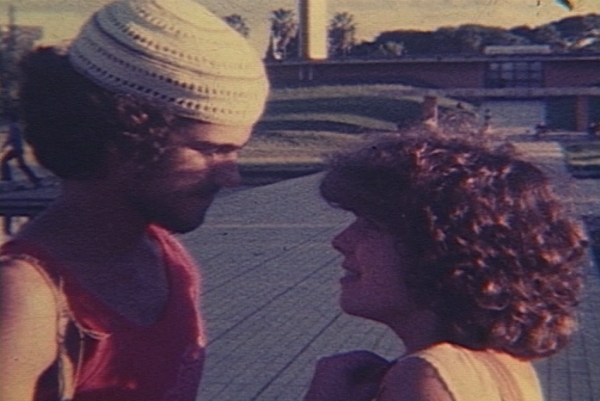DEU PRA TI ANOS 70 (Seventies, you're over)
|
(Super-8 mm, 108 min, color, 1981) Stories from the seventies, told from the point of view of someone who woke up to the world during that time. Through a 10-year period, Marcelo and Ceres find and lose each other in dances, bars, cinemas, university and camping sites. On 1980's New Year's Eve, they still have reasons to dream, and now, together. |
 Photo by Nelson Nadotti: Pedro Santos and Ceres Victora |
Directors: Nelson Nadotti and Giba Assis Brasil
Executive Producers: Nelson Nadotti and Giba Assis Brasil
Written by: Giba Assis Brasil, Nelson Nadotti and Alvaro Luiz Teixeira
Cinematographer: Nelson Nadotti
Music by: Nei Lisboa and Augusto Licks
Editor: Nelson Nadotti
Assistant Directors: Carlos Gerbase and Hélio Alvarez
Distribution: Casa de Cinema PoA
Main Cast:
Pedro Santos (Marcelo)
Ceres Victora (Ceres)
Deborah Lacerda (Margareth)
Júlio Reny (Fred)
Prizes
- 5th Gramado Super-8 Film Festival, 1981:
Best Film.
Reviews
"DEU PRA TI ANOS 70 has come to stir up the panorama of the current film culture of Rio Grande do Sul. Even though it is a film made in Super 8, it can be seen as any film in a movie theater. As a film, it equates with one of its characters, Margarete, a bit of an outsider, a bourgeois and an anarchist, whose positions could be questioned by a more dispassionate critic. But you cannot resist loving her when your emotions take over."
(Tuio Becker, FOLHA DA TARDE, Porto Alegre, 04/04/81)"When you see a film with the qualities of DEU PRA TI ANOS 70 you can really understand the meaning of the expression 'popular art'. It is the art that speaks about the people, about persons, and knows how to do it, without resorting to naivety to move you, to make you laugh and to make you think."
(Hélio Nascimento, JORNAL DO COMÉRCIO, Porto Alegre, 13/05/81)"It is impossible not to be excited with the teenagers who show up on the screen, with their dreams, their disillusions, their dramas - and their comical simplicity (a bit like in SUMMER OF '42 and AMERICAN GRAFITTI). Moreover, it is a film about Porto Alegre, about Rio Grande do Sul, our people, our slang. And that, in a city and in a state that are simply unable to preserve their cultural values, is of the utmost importance."
(Moacyr Scliar, ZERO HORA, Porto Alegre, 25/05/81)"The directors managed to mix the right amounts of local cultural references (the southern accent gives the film a special charm) and external influences (homages to Fellini and Lelouch, specially his Toute Une Vie - And Now My Love). If it is analysed adequately, it is evident that the film's structure is highly complex, foregoing the traditional flashbacks in order to use fragmented situations at different point in time, using the couple (Ceres and Marcelo) as the thread of the story, following them from being merely acquaintances until they find out they are in love with each other."
(Rubens Ewald Filho, O ESTADO DE SÃO PAULO, 27/06/81)
24/03/1981







